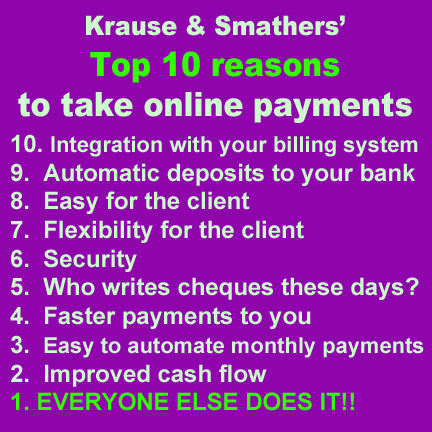
CHICAGO — More than once in sessions at the American Bar Association’s TECHSHOW yesterday, the idea of lawyers and law firms not willing to take credit cards came up. And not in the good way.
 In one session on starting your own firm, the panel said not taking credit cards is basically giving money away. You have to let clients pay how they want to pay and nowadays that’s how lots of people want to pay for everything and anything. Legal fees shouldn’t be any different.
In one session on starting your own firm, the panel said not taking credit cards is basically giving money away. You have to let clients pay how they want to pay and nowadays that’s how lots of people want to pay for everything and anything. Legal fees shouldn’t be any different.
Not taking credit cards is “just another thing about lawyers that consumers don’t like,” said Jeffrey S. Krause, a founding partner of legal consultancy Solfecta LLC, in a later panel on empowering your client through technology.
While there are some concerns about taking credit cards and how to allocate funds into the necessary accounts, there are ways around that, said Rochelle Washington of the Practice Management Advisory Service of the District of Columbia Bar. It just takes a bit of planning.
More importantly, as Krause and co-panellist Amani Smathers, of SeyfarthLean Consulting, pointed out in their session, not taking credit cards is simply another sign of how the legal business isn’t changing with the rest of the business world.
“Consumers expect to have more power in the relationship than in the past,” said Krause. “They want to have some control in the relationship.”
He pointed out that practically everyone in the room (mostly all of them lawyers) accesses their bank accounts online, shops online, files taxes online, and otherwise uses technology frequently in their daily lives. They like and want to have transparency and engagement in their dealings, such as being able to check the status of an order online.
“Why expect our clients to be any different?” he asked.
 So what makes clients feel disempowered? Here are a few examples from Smathers:
So what makes clients feel disempowered? Here are a few examples from Smathers:
• Files not readily accessible to allow status updates;
• Having to wait for lawyers to act or respond;
• Lawyers controlling every aspect of the relationship;
• Having to make a trip to a lawyer’s office to deliver documents or sign something, especially if you feel it can be done in other ways.
Not only do consumers want to be engaged but they are also comfortable doing things for themselves and that’s even more reason to empower your clients and get them to help you help them. And that is especially true of the next generation of clients.
So what should and could you easily be doing in your law firms to make for a better balance in the lawyer-client relationship and make yourself stand out from the crowd and more importantly make your law practice relevant to your clients — the ones you have and the ones you’re trying to get? Here are a few options:
• Introduce client portals that allow for online, interactive client collaboration where clients can view case information, pay bills, and upload documents. They also make your practice management easier.
• Automate client intake. It reduces errors, makes intakes faster and more efficient, and improves data management in the firm.
• Use electronic signatures whenever and wherever possible.
• Implement web-enabled document automation; use your legal expertise to build valuable forms for clients.
• Create advisory tools that can help produce preliminary determinations in cases, ie: give a potential client a simple answer without them having to talk to a lawyer first.
• Allow for online payments!!
• Also allow for online scheduling of appointments and notifications (it doesn’t have to mean opening up your calendar to the whole world).
• Up your security by using secure methods of online communication with clients. E-mail is not secure.
“Honestly, none of this stuff is new,” noted Smathers, it’s just that not enough law firms do it.
“It’s never been easier, cheaper, or more important” to introduce these measures, she adds.